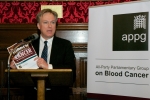As the most common type of cancer among children, teenagers and young people in the UK, the upcoming NHS plan needs a strong emphasis on ensuring the needs of blood cancer patients and their families are met and given continued focus by the Government.
As Chair of the All-Party Parliamentary Group on Blood Cancer this is a call I continue to make ahead of the publication of the Government’s Ten Year Plan for the National Health Service.
Awareness of symptoms among GPs and the wider public is the first step to reducing the impact of blood cancer. These include, but are by no means restricted to fatigue, unexplained weight loss and easy bruising or bleeding. While a patient may think any of these are perhaps a result of a busy lifestyle, the reality is they could have a cancer which 1 in 19 people in this country will develop at some point in their lives.
Blood cancer is the UK’s fifth most common cancer but the third biggest cancer killer. At the start of this year the APPG published its first report, which calls for GPs to undertake a simple blood test for anyone presenting with one or more of the symptoms of blood cancer.
The number of GP visits needed before diagnosis is significantly higher for blood cancer than for other forms of the disease. The number of blood cancer patients who had to see their GP three or four times before a diagnosis is almost 1 in 6, in contrast to breast cancer patients, for whom only 1 in 42 need such regular visits.
On average, a GP will see eight cases of cancer each year, with one of these being blood cancer. Further awareness of the symptoms among the public and across the medical profession are needed.
A common response during our inquiry was that while patients would receive regular access to healthcare professionals during their treatment, support would stop as soon as this had concluded. One patient likened the experience as having “fallen off the end of a conveyor belt” with no follow-up help.
Additionally, there are approximately 27,000 people on ‘Watch and Wait’ – usually used for patients with blood cancers that are stable and slow-growing – who are not yet at the point of starting treatment.
For those who have completed treatment, or for those who are on ‘Watch and Wait’, blood cancer is a long-term condition. Patients responding to the APPG inquiry told us that the term “living beyond” blood cancer was irrelevant as it is a part of their daily lives.
The Government is right to treat mental health on a par with physical health, and the NHS Ten Year Plan needs to ensure recognition of the fact that blood cancer is different to other types of cancer.
There are around 3,000 mental health therapists co-located at GP surgeries. While cancer as a general condition is a part of their training, it is vital for blood cancer patients that therapists have an understanding of the differences between their condition and solid tumour cancers. This is in addition to a knowledge of the ‘Watch and Wait’ process while waiting for treatment to start, as well as needing support after treatment has ended.
One way to ensure such understanding throughout the wider medical profession would be the inclusion of blood cancer in data collection initiatives. Clinical Commissioning Groups and Cancer Alliances do not group blood cancer into a single disease area, unlike the National Cancer Patient Experience Survey, which means blood cancer currently receives less attention and therefore resources.
I am also calling for the inclusion of blood cancer in the Cancer Dashboard, which currently only covers breast, colorectal, lung and prostate cancers.
By ensuring the full might of the NHS is placed behind raising awareness of this ‘hidden’ cancer, we can ensure earlier diagnosis, enhanced support, and improved outcomes for patients.
Henry Smith
Member of Parliament for Crawley
Chair, All-Party Parliamentary Group on Blood Cancer

